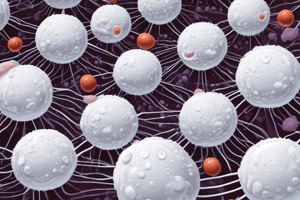Podcast
Questions and Answers
Which type of leukocyte is the smallest?
Which type of leukocyte is the smallest?
- Basophils
- Neutrophils
- Monocytes
- Lymphocytes (correct)
What percentage of white blood cells do lymphocytes account for?
What percentage of white blood cells do lymphocytes account for?
- Less than 1%
- More than 50%
- 25% (correct)
- 2-8%
Which leukocyte is the largest of all white blood cells?
Which leukocyte is the largest of all white blood cells?
- Neutrophils
- Lymphocytes
- Monocytes (correct)
- Basophils
What are monocytes called when they enter the tissue?
What are monocytes called when they enter the tissue?
What is the principle function of neutrophils?
What is the principle function of neutrophils?
Which leukocyte releases histamine and heparin to assist in inflammation?
Which leukocyte releases histamine and heparin to assist in inflammation?
What is the role of prothrombin in blood clotting?
What is the role of prothrombin in blood clotting?
Where does erythropoiesis occur?
Where does erythropoiesis occur?
What is the final stage of red blood cell formation?
What is the final stage of red blood cell formation?
How long does it take for reticulocytes to become mature red blood cells?
How long does it take for reticulocytes to become mature red blood cells?
Which hormone is responsible for promoting and maintaining the development of adrenal glands?
Which hormone is responsible for promoting and maintaining the development of adrenal glands?
Which gland is responsible for producing melatonin, which is responsible for circadian rhythm and initiating sleepiness?
Which gland is responsible for producing melatonin, which is responsible for circadian rhythm and initiating sleepiness?
Which cells in the pancreas secrete glucagon, which increases blood sugar by breaking down glycogen in the liver?
Which cells in the pancreas secrete glucagon, which increases blood sugar by breaking down glycogen in the liver?
Which hormone is responsible for metabolism regulation?
Which hormone is responsible for metabolism regulation?
Which gland is the primary organ of the lymphatic system and secretes hormones that enable lymphocytes to develop into mature T cells?
Which gland is the primary organ of the lymphatic system and secretes hormones that enable lymphocytes to develop into mature T cells?
Which process involves the ingestion and destruction of microorganisms or other small particles?
Which process involves the ingestion and destruction of microorganisms or other small particles?
Which type of cells present bits of processed pathogens to cells of the adaptive immune system?
Which type of cells present bits of processed pathogens to cells of the adaptive immune system?
Which type of white blood cells are capable of diapedesis?
Which type of white blood cells are capable of diapedesis?
Which class of white blood cells do not have visible granules within their cytoplasm?
Which class of white blood cells do not have visible granules within their cytoplasm?
Which organ is the target for Anti-Diuretic Hormone (ADH)?
Which organ is the target for Anti-Diuretic Hormone (ADH)?
What is the function of the adrenal cortex?
What is the function of the adrenal cortex?
Which part of the adrenal gland releases glucocorticoids?
Which part of the adrenal gland releases glucocorticoids?
What is the function of the zona reticularis in the adrenal gland?
What is the function of the zona reticularis in the adrenal gland?
Where is the pituitary gland located?
Where is the pituitary gland located?
What is released by the anterior pituitary gland?
What is released by the anterior pituitary gland?
What is the function of thyroid stimulating hormone (TSH)?
What is the function of thyroid stimulating hormone (TSH)?
What is the function of prolactin?
What is the function of prolactin?
What is the function of follicle-stimulating hormone (FSH)?
What is the function of follicle-stimulating hormone (FSH)?
What is the function of aldosterone?
What is the function of aldosterone?
Flashcards are hidden until you start studying
Study Notes
Leukocytes
- Neutrophils are the smallest type of leukocyte.
- Lymphocytes account for approximately 30% of white blood cells.
- Monocytes are the largest type of leukocyte.
- Monocytes are called macrophages when they enter tissue.
- The primary function of neutrophils is to ingest and destroy microorganisms and other small particles through phagocytosis.
- Basophils release histamine and heparin to assist in inflammation.
Blood Clotting
- Prothrombin plays a crucial role in blood clotting.
Red Blood Cell Formation
- Erythropoiesis occurs in the bone marrow.
- The final stage of red blood cell formation is the maturation of reticulocytes, which takes around 1-2 days.
Hormones
- Adrenocorticotropic hormone (ACTH) promotes and maintains the development of adrenal glands.
- The pineal gland produces melatonin, which regulates circadian rhythm and initiates sleepiness.
- Alpha cells in the pancreas secrete glucagon, which increases blood sugar by breaking down glycogen in the liver.
- Thyroid hormone regulates metabolism.
- The thymus gland is the primary organ of the lymphatic system and secretes hormones that enable lymphocytes to develop into mature T cells.
Immune System
- Phagocytosis is the process of ingesting and destroying microorganisms or other small particles.
- Antigen-presenting cells (APCs) present bits of processed pathogens to cells of the adaptive immune system.
- Leukocytes capable of diapedesis are neutrophils and monocytes.
- Lymphocytes are a type of white blood cell that does not have visible granules within their cytoplasm.
Endocrine System
- The kidney is the target organ for Anti-Diuretic Hormone (ADH).
- The adrenal cortex produces glucocorticoids and mineralocorticoids.
- The zona reticularis in the adrenal gland produces androgens.
- The pituitary gland is located at the base of the brain.
- The anterior pituitary gland releases hormones such as thyroid stimulating hormone (TSH), prolactin, and follicle-stimulating hormone (FSH).
- TSH stimulates the thyroid gland to produce thyroid hormone.
- Prolactin stimulates milk production in lactating females.
- FSH regulates the development of gametes (sperm and eggs).
- Aldosterone regulates electrolyte balance and blood pressure.
Studying That Suits You
Use AI to generate personalized quizzes and flashcards to suit your learning preferences.




